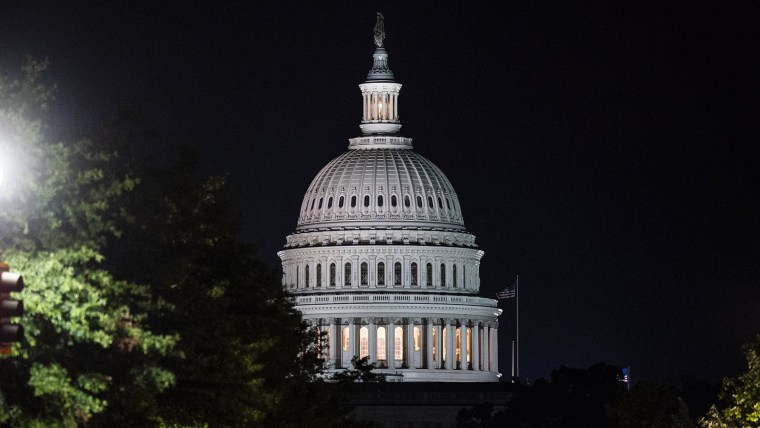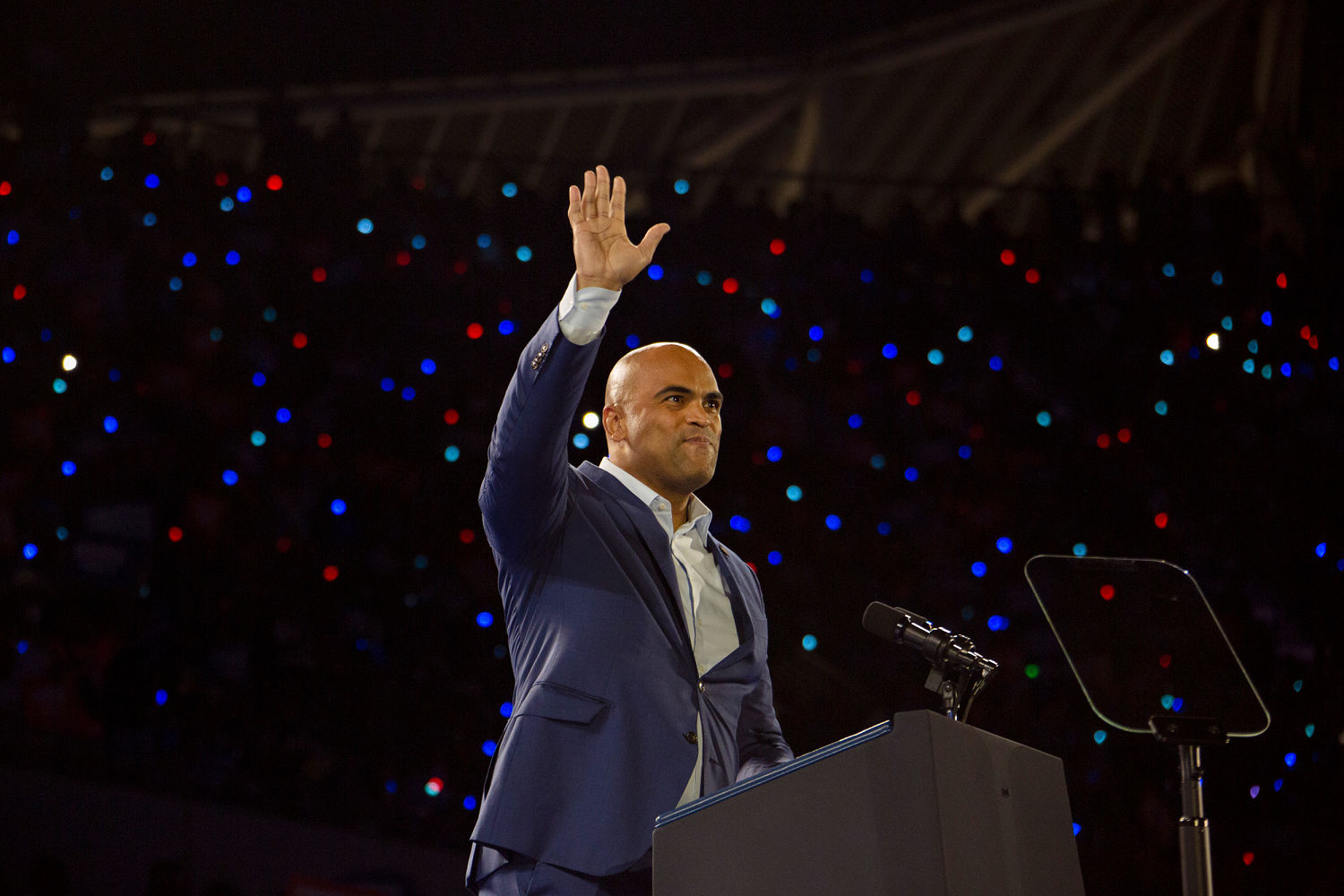Senate Republicans scramble to resolve tense divisions as Trump threatens their vacation over his big bill


WASHINGTON — The Senate bill’s Medicaid cuts are too aggressive for politically vulnerable Republicans.
Its clean energy funding cuts are too tame for conservative House Republicans, who are threatening to sink the legislation.
And the $10,000 cap on state and local tax deductions, or SALT, is a nonstarter for key blue-state House Republicans.
The GOP-led Congress is barreling toward its own deadline to pass the “One Big Beautiful Bill Act,” and it’s getting messy in the final stretch as President Donald Trump ramps up the pressure on lawmakers to put it on his desk by July 4.
“To my friends in the Senate, lock yourself in a room if you must, don’t go home, and GET THE DEAL DONE THIS WEEK,” Trump wrote Tuesday on Truth Social. “Work with the House so they can pick it up, and pass it, IMMEDIATELY. NO ONE GOES ON VACATION UNTIL IT’S DONE.”
Passing the party-line bill through the House and the Senate, where Republicans have three votes to spare in each chamber, will be a daunting task that requires bridging acrimonious divides. The toughest part will be settling on a final product that can unify Senate GOP moderates, like Susan Collins of Maine and Lisa Murkowski of Alaska, with the far-right House Freedom Caucus. Those two factions have tended to drive the hardest bargain.
After a conference lunch meeting, Senate Majority Leader John Thune, R-S.D., told reporters the Senate’s goal is to get the bill “across the finish line by the end of the week,” with the goal of crafting a package that can win 51 votes.
“Hopefully when push comes to shove and everybody has to say yes or no, we’ll get the number of votes we need,” he said.
A significant source of consternation is the steeper Medicaid cuts in the Senate bill, which include lowering provider taxes that are used to fund the program, and limiting payments to states.
Sen. Thom Tillis, R-N.C., who faces re-election in a battleground state next year, warned his party at a meeting Tuesday that it will lose the 2026 midterm elections if it pushes ahead on proposed Medicaid cuts. He compared the situation to the heavy losses Democrats suffered in the 2014 midterms after a rocky Obamacare rollout, according to a source in the room.
Tillis circulated a document Monday with estimates of how much Medicaid money states would lose if the Senate bill passes, including $38.9 billion in losses for North Carolina, $16 billion for Tennessee and $6.1 billion for Missouri.
Sen. Josh Hawley, R-Mo., said the current version of the bill — which would also extend the 2017 Trump tax cuts — doesn’t have enough votes and would harm rural hospitals in his state.
“Senate leadership now needs to fix this. They’re the ones who have invented this new rural hospital defund scheme that the House says they can’t pass, that’s going to close rural hospitals,” he said. “It was a bad idea on their part to fool around with it.”
Republicans are looking at creating a fund to protect rural hospitals from the negative consequences of their bill. Sen. Bill Cassidy, R-La., said only a small proportion of Medicaid funds go to those institutions, but he argued that “having a fund specifically for rural hospitals is a targeted way to help ensure their viability.”
Senate GOP leaders want to include the Medicaid cuts to limit the bill’s red ink. The nonpartisan Congressional Budget Office projects that the version the House passed would add $2.4 trillion to the debt over the next 10 years.
On Tuesday, 16 House Republicans — almost all representing competitive districts — sent a letter rebelling against the Senate’s Medicaid cuts. They fretted that those policies would “place additional burdens on hospitals,” among other things.
“Protecting Medicaid is essential for the vulnerable constituents we were elected to represent. Therefore, we cannot support a final bill that threatens access the coverage or jeopardizes the stability of our hospitals and providers,” wrote the House Republicans, led by David Valadao of California, whose district has one of the highest shares of Medicaid recipients in the country.
Democratic Congressional Campaign Committee spokesperson Justin Chermol responded to the letter quickly, questioning the sincerity of the Republicans’ opposition to Medicaid cuts.
“Spare us the performative bulls—,” he said in a statement. “These so-called moderates already voted for the largest cut to Medicaid in American history — and when the time comes, they’ll cave to their D.C. party bosses once again to give their billionaire donors a massive tax break.”
On the other hand, the Senate bill pares back some of the clean energy cuts, a move that House conservatives say is unacceptable. That’s because much of the green tax credits and funding goes to red states, and Republican senators are reluctant to take it away.
Rep. Andy Harris, R-Md., the chair of the Freedom Caucus, said the Senate bill “backtracks” on clean energy cuts and threatened to vote against it. Rep. Chip Roy, R-Texas, who voted for the House bill, has also objected to the energy provisions and vowed to oppose the current Senate bill.
Roy also warned GOP leaders not to use the July 4 deadline to try to force members to swallow a bill that isn’t palatable to them.
“Rumor is Senate plans to jam the House with its weaker, unacceptable [One Big Beautiful Bill] before 7/4. This is not a surprise but it would be a mistake,” Roy said on X. “The bill in its current Senate form would increase deficits, continue most Green New Scam subsidies, & otherwise fail even a basic smell test… I would not vote for it as it is.”
Sen. John Kennedy, R-La., pointed to another reason the process is slow: The bill is still being vetted by the parliamentarian to make sure it complies with Senate rules limiting its provisions to budget matters, a process known as the “Byrd bath.”
“There’s only so much you can pre-negotiate, because the bill is still changing over here as a result of a Byrd bath. I think we’re almost done with the Byrd bath. We’re making progress in terms of talking through it, but I think we’re headed toward the bill hitting the floor sometime toward the end of the week,” Kennedy said. “And then will everybody be happy? No. But everybody will have a chance to offer an amendment or two.”
Treasury Secretary Scott Bessent, who attended Tuesday’s Senate Republican meeting, said afterward that he expects a solution on the state and local deduction “in the next 24 to 48 hours.”
A decisive group of House Republicans from states like New York and California is threatening to sink the entire bill unless the SALT cap is at least $40,000 per tax filer. But Senate Republicans have no interest is raising the cap to that level because none of them represent blue states where the deduction is a big issue.
Bessent added that the United States “getting close to the warning track” on the debt limit, which he has urged Congress to raise before August to prevent a default by that month’s deadline.




